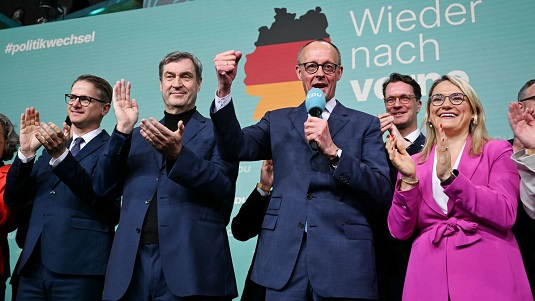
The German exit polls have mirrored those taken during the election. The CDU/CSU are out in front with circa 30% of the vote, the far right AfD on around 20%, the SPD have collapsed to around 16% - its worst result since the 1880s. The Greens are on about 13%, and the late surge for Die Linke puts them between eight and nine per cent. In political terms, Germany has become a "normal country". The centre has caved in (the FDP are on course to lose all their seats), the centre left have taken a battering, and the rise of the extreme right has grabbed the headlines.
There are obvious parallels between what's happened in Germany and what's unfolding here. A centrist coalition of sensible grown ups have presided over years of economic stagnation and lacklustre investment. Coincidentally, farmers' protests over the cancellation of a tax break was one of the nails driven into the SPD-FDP-Green coalition's coffin. The final straw was the provocative proposal of the FDP to take the axe to social security and public spending, which proved to be so popular that again they find themselves without representatives in the Bundestag. Having learned nothing and uninterested in the lessons of history, the SPD and Greens both pursued policies at odds with their popular constituencies and have paid the political price. As such, it was easy for the AfD to pose as the champions of ordinary Germans against a political establishment tone deaf on immigration, the cost of living, and efforts at undermining German identity.
The AfD have been assisted in this by Friedrich Merz, the Union's leader and incoming chancellor. Like the Tories his party have banged on about immigration, legitimating and amplifying an AfD that can easily outflank their positions. Indeed, if Merz has achieved anything long-lasting in toppling a decrepit opponent on his party's second lowest federal vote share, it is to confirm the Christian Democrats as the main right wing party in the west while allowing AfD to monopolise "real concerns" in the east. Merz has already courted notoriety by effectively cooperating with them in the Bundestag vote on a vote about immigration, and undoubtedly further such "accidental" alliances will be forged over the course of the next parliamentary session. As the party appears to have lost a million supporters to the far right, Merz will be hoping his "tough" approach will ensure further AfD-curious Union voters will stick with them, and that the old east/west border will confirm his partitioning of the right and stop them from setting up shop in his heartlands.
No one should not be complacent about the rise of the AfD. A fifth of the popular vote is only going to inspire more extremism and with it more violence against immigrant communities, sexual minorities, women, and political opponents. A Merz-led government doesn't care. Defeating the AfD and driving them out of politics will not come from above.
Which makes the small story of Die Linke's resurgence significant. First, they saw off the Sahra Wagenknecht Alliance, a reactionary split from the Left that embraced Blue Labourism with German characteristics. Going right on culture and left on economics is on-paper smart politics, since the AfD are effectively the FDP plus open racism and overlaps with fascist groups. But then again, none of the far right's supporters have voted AfD because they think free markets and neoliberalism are very good actually. Here, as there, it was a hiding to nothing and Die Linke have squelched them. Quite the turn around since BSW were beating them in the polls a few months ago. Some might put this down to the viral anti-fascist speech of co-leader Heidi Reichinnek, and there is some evidence - thanks to the largest turnout since 1987 - that a mix of this, its socially liberal pro-working class messaging and policies struck with the rising generation. Die Linke were by far and away the most popular party among younger voters.
Obviously, Die Linke are not perfect. The self-removal of the anti-woke, pro-Russia right has undoubtedly helped the party, but divisions remain between those elements who are soft left and want a slice of the government pie and those wanting more radical social change, and criss-crossing this are divisions about Israel and Palestine. Undoubtedly, given the unexpected successes, German media actors and others looking to rebuild the shattered SPD at their expense will try using these divisions to sap the party's energy and drive new supporters away. Because having a mass fascist-adjacent party as the second party in the Bundestag is a trifling concern versus a left wing insurgency. Nevertheless a harbinger of good things to come, one hopes.
Image Credit
1 comment:
As a German who voted Die Linke for the second time in his life after much soul-searching (I usually supported either the Greens or minor parties like the Pirates before), I suspect the biggest reason they didn't get even more support (maybe over 10%) was their stance on the Ukraine war. While they aren't explicitly pro-Russia like BSW, their insistence that Putin could be forced to negotiate in good faith if only there were targeted sanctions on the pro-war oligarchs in Russia instead of sending more weapons to the Ukraine was a deal-breaker for a lot of nominal progressives I've spoken to. I also still worry myself if I've made the right choice in this regard sometimes, since I would like to see the Ukraine better defended.
Post a Comment